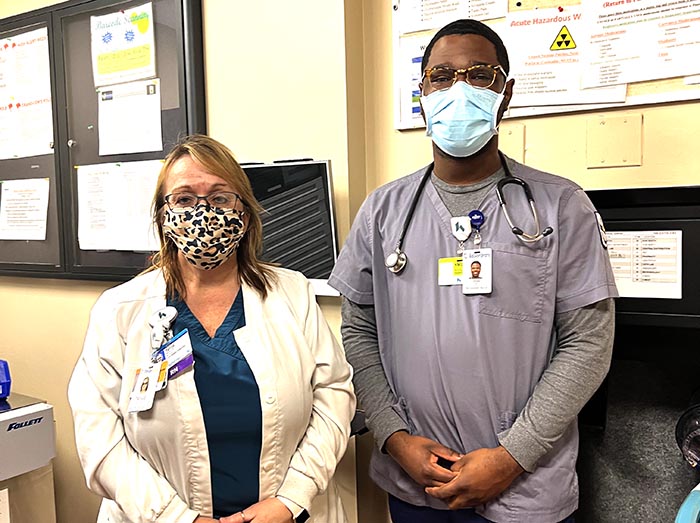
Hospitals have faced many challenges during the COVID-19 pandemic. To help provide critical support to the nursing staff at area hospitals, Edison State Community College students recently joined the Plan, Do, Study, Act (PDSA) Pilot Project.
A few months into the pandemic, area schools of nursing began meeting with regional hospital systems to discuss how they could provide support to nursing staff. Due to the restrictions put in place for caring for COVID patients and the limited supply of personal protective equipment (PPE), finding an avenue for students to support the hospitals was challenging. All of this changed in January 2022 when Peggy Mark, Chief Nursing Officer (CNO) of Premier Health; Jennifer Shull, CNO of Kettering Health; and Jayne Gmeiner, CNO of Dayton Children’s, brought the group together to discuss the possibility of a Rapid Cycle Change Pilot.
Conditions in the hospitals are challenging when the in-patient population hits surge capacity, but this has been made more difficult with workers calling off due to illness or simply as a result of being exhausted from the stress of caring for extremely sick and dying patients for the past two years. The pilot program was developed to allow participating schools to work with a point person at each of the two biggest hospital systems in the region to schedule students to serve in a “Helping Hands” role.
“Helping Hands gives you the privilege to stand alongside medical professionals to fight COVID back,” said Edison State nursing student Emily Kindell. “I spent an hour cleaning and stocking one of their supply rooms. Many might think that wasn’t much, but stocking those containers freed up time for staff, allowing them to spend more time praying, passing medications, transferring, or talking to patients. There are so many ways to help; wiping down countertops, stocking supply closets, or even just grabbing something when asked makes a difference.”
Students’ schedules flex from week to week depending on what real-time gaps are identified on the unit that week. The nursing faculty at each college works with the hospital clinical liaison and charge nurses to identify what tasks would support the optimal functioning of the unit while maintaining the integrity of the nursing course objectives.
Those serving in Helping Hands roles complete nonclinical tasks such as helping with turning, feeding, bathing, or ambulating patients; cleaning the nurse’s station or medication room; and restocking supplies or linens. Students completing their final capstone or precepted hours can complete more complex tasks, including measuring intake and output, dressing changes, blood sugars, and medication administration.
“I’m thankful I could participate in the Helping Hands program,” said Mary Wood, a nursing student at Edison State. “It was such a blessing to be able to help wherever I could, and it was also interesting and educational to see the hospital environment from another perspective. I thoroughly enjoyed the experience.”
“This experience allowed me to provide a service to hospital staff while also gaining exposure to the patient care environment,” added Edison State nursing student Marcus Cornett. “I have a greater appreciation and understanding for the collective effort that’s needed to provide health care services.”
Edison State students joined the pilot in February and will participate through the end of the spring semester. Overall feedback from hospital staff, nursing clinical faculty, and students has been overwhelmingly positive. Faculty can work with students to hone essential basic care and comfort skills while still providing valuable experiences that allow them to care for patients in their student-nurse role.
“The Helping Hands community has been welcomed by the staff on Kettering Health Dayton Med-Surg 6100 with exuberance and enthusiasm,” said Tanita Brock, Edison State Adjunct Faculty at Kettering Health Dayton. “Each week, the assigned student helps with stocking med rooms, sanitizing work areas, restocking PPE carts, helping pull patients up in bed, helping patients to the bathroom, providing fresh water pitchers to patients’ rooms, and assisting the wound nurse with a second set of hands when needed. As their instructor, I’m proud of the effort they’ve put into this new role.”
“Edison State could not be more pleased to partner with our two leading regional health care organizations,” said Jill Bobb, Associate Dean of Nursing and Emergency Medical Services at Edison State. “This partnership has provided great benefits to all parties involved and has allowed for improved patient care, which is what we are all striving to achieve.”
Photo: Tanita Brock, Edison State Adjunct Faculty at Kettering Health Dayton (left), and Chad Fletcher, Edison State Nursing Student (right)

